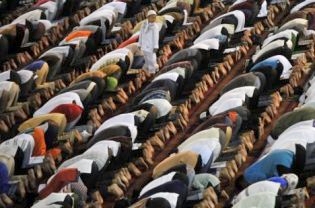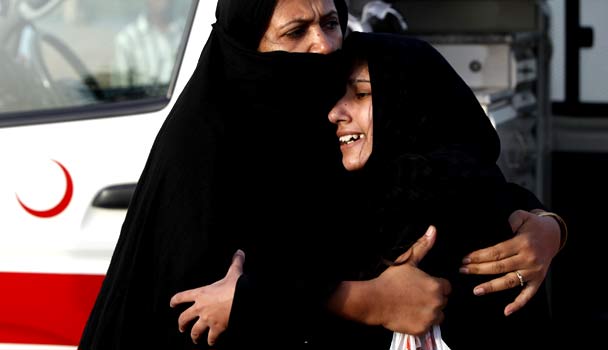 | INDONESIA |
Study Finds Rising Intolerance Among Indonesian Muslims
September 30, 2010

Indonesian worshipers at the Istiqlal Mosque in Central Jakarta. A new survey by the Center for the Study of Islam and Society has found “a worrying increase” in religious intolerance among Muslims in 2010 compared to 2001. (Antara Photo)
Jakarta. Indonesia’s Muslim majority has become less tolerant over the past decade and the government of President Susilo Bambang Yudhoyono is turning a blind eye to the problem, a survey has found.
The new survey by the Center for the Study of Islam and Society found “a worrying increase” in religious intolerance among Muslims in 2010 compared to 2001.
Centre chief Jajat Burhanudin said on Wednesday that certain ministers in Yudhoyono’s cabinet actively encouraged intolerance, while the police too often failed to protect minority groups.
“If this continues, the process of democracy in this country will be disrupted as people will justify their acts in the name of Islam,” he said.
Of 1,200 adult Muslim men and women surveyed nationwide, 57.8 percent said they were against the construction of churches and other non-Muslim places of worship, the highest rate the study centre has recorded since 2001.
More than a quarter, or 27.6 percent, said they minded if non-Muslims taught their children, up from 21.4 percent in 2008.
Burhanudin said the results were good news for radical groups in the world’s most populous Muslim-majority country.
“Religious intolerance can encourage people them to become radicals, join terrorist networks or at least support the agenda of fundamentalists who commit violence in the name of religion,” he said.
Indonesia’s constitution guarantees freedom of religion and the country of some 240 million people, 80 percent of whom are Muslim, has ratified the International Covenant on Civil and Political Rights.
But it has a festering problem with homegrown, Al Qaeda-inspired terror groups, as well as stick-wielding vigilantes that constantly agitate, often violently, for Shariah or Islamic law.
In the latest serious incident, extremists allegedly stabbed a church elder and bashed a female priest outside Jakarta earlier this month.
Thousands of members of the minority Islamic Ahmadiya sect have lived in constant fear of attack since a 2008 ministerial decree limited their religious freedoms.
Burhanudin said ex-general Yudhoyono, who invited Islamic parties into his governing coalition, “doesn’t dare” to crack down on Muslim extremists.
“There is no systematic or serious effort to reduce the strength of Islamism and intolerance,” he said.
Agence France-Presse
The new survey by the Center for the Study of Islam and Society found “a worrying increase” in religious intolerance among Muslims in 2010 compared to 2001.
Centre chief Jajat Burhanudin said on Wednesday that certain ministers in Yudhoyono’s cabinet actively encouraged intolerance, while the police too often failed to protect minority groups.
“If this continues, the process of democracy in this country will be disrupted as people will justify their acts in the name of Islam,” he said.
Of 1,200 adult Muslim men and women surveyed nationwide, 57.8 percent said they were against the construction of churches and other non-Muslim places of worship, the highest rate the study centre has recorded since 2001.
More than a quarter, or 27.6 percent, said they minded if non-Muslims taught their children, up from 21.4 percent in 2008.
Burhanudin said the results were good news for radical groups in the world’s most populous Muslim-majority country.
“Religious intolerance can encourage people them to become radicals, join terrorist networks or at least support the agenda of fundamentalists who commit violence in the name of religion,” he said.
Indonesia’s constitution guarantees freedom of religion and the country of some 240 million people, 80 percent of whom are Muslim, has ratified the International Covenant on Civil and Political Rights.
But it has a festering problem with homegrown, Al Qaeda-inspired terror groups, as well as stick-wielding vigilantes that constantly agitate, often violently, for Shariah or Islamic law.
In the latest serious incident, extremists allegedly stabbed a church elder and bashed a female priest outside Jakarta earlier this month.
Thousands of members of the minority Islamic Ahmadiya sect have lived in constant fear of attack since a 2008 ministerial decree limited their religious freedoms.
Burhanudin said ex-general Yudhoyono, who invited Islamic parties into his governing coalition, “doesn’t dare” to crack down on Muslim extremists.
“There is no systematic or serious effort to reduce the strength of Islamism and intolerance,” he said.
Agence France-Presse
Copyright 2010 The Jakarta Globe
 by Sonya Rehman
by Sonya Rehman










